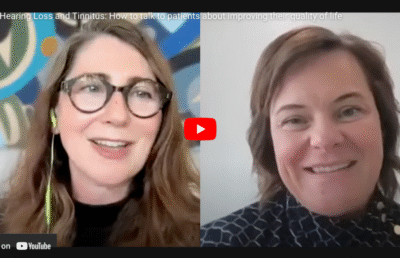As we age, it becomes increasingly important to stay on top of our health, including our hearing. Age-related hearing loss, known as presbycusis, is common but it is not inevitable, and it does not have to result in a loss of self, social connections, or mental health.
Learning more about how to protect against hearing loss and the various modern treatments available can go a long way to supporting a lifelong hearing health journey.
Below, we will cover 4 key things to know about hearing loss as we age and offer some suggestions on how to maintain your active and vibrant lifestyle over time.
4 Things to Know About Hearing Loss and Aging
1. It’s More Common Than You Think
Hearing loss can be a natural part of aging and is more common than you might imagine. In fact, as we age, our inner ear structures start to deteriorate, which can result in hearing loss.
According to the National Institute on Deafness and Other Communication Disorders (NIDCD), about one in three people between 65 and 74 have some degree of hearing loss. That number jumps to nearly 50% over the age of 75.
It is important to note that hearing loss is not limited to older people; it can happen to anyone, at any age, due to a variety of factors like exposure to loud noise, ear infections, and certain medications. The NIDCD estimates that around 15% of American adults aged 18 and over have some trouble hearing.
Despite the prevalence of hearing loss, many people don’t seek help. Some may feel embarrassed and think it is just a normal part of aging, while others simply do not realize that they are experiencing hearing loss. Getting your hearing checked regularly is important, especially as you get older. Regular hearing exams can help detect hearing loss early, allowing you to take steps to manage and prevent further damage.
2. Early Detection is Key
The earlier you detect hearing loss, the easier it is to manage. That’s why it’s crucial to get your hearing checked regularly. If you’re over 50, it’s recommended that you get your hearing tested every three years unless there are underlying risk factors.
Early detection of hearing loss is critical to managing the condition and preventing further damage. When left untreated, hearing loss can significantly impact your quality of life, affecting your relationships and ability to communicate with others, enjoy social activities, and even stay safe in certain situations. For example, if you can’t hear the sound of a car approaching or someone calling out to you, you could be at risk of an accident.
Regular hearing evaluations are the best way to detect hearing loss early, even before you notice any symptoms or significant disruptions. During a hearing evaluation, an audiologist will test your ability to hear different frequencies and volumes of sound. If any hearing loss is detected, they can work with you to develop a treatment plan that suits your needs and lifestyle.The earlier you detect hearing loss, the more options you have for managing it.
But it’s not just about treatment options – early detection can also help prevent further damage to your hearing. If you continue exposing your ears to loud noise or other harmful environments, you could be at risk of further hearing loss and irreversible damage. To ensure that your hearing remains healthy, taking preventive steps, such as avoiding loud environments and getting regular hearing tests, is essential.
3. Getting a Hearing Device Opens New Doors
It can be challenging for those with hearing loss to take the next step and seek professional help. Understandably, you might feel hesitant about admitting to a hearing problem or wearing a hearing device in public; however, getting a hearing device can open up a whole new world of possibilities.
Working with an audiologist to identify the right hearing device and treatment options can improve your ability to communicate with others, enjoy your favorite activities, and even increase your safety. You can enjoy clear and natural-sounding speech with suitable devices and settings, even in noisy environments.
In addition, many hearing devices today are discreet and come in various styles and colors, so you can find one that suits your preferences and lifestyle. You don’t have to worry about standing out or feeling self-conscious – in fact, many people find their hearing device to be a helpful and impactful accessory.
By embracing your hearing loss and getting a hearing device, you’re not losing out – you’re actually gaining new opportunities and experiences.
4. Lifestyle Choices Matter
Believe it or not, your lifestyle choices can significantly impact your hearing health. When it comes to hearing loss, lifestyle choices can play a significant role. Exposure to loud noise, for example, is a common cause of hearing loss, and it can occur in both occupational and recreational settings. This means that musicians, construction workers, and anyone who enjoys attending concerts or sporting events are at risk of developing hearing loss.
Other lifestyle factors contributing to hearing loss include smoking, certain medications, and underlying health conditions such as high blood pressure and diabetes. By making healthy lifestyle choices, such as quitting smoking, avoiding loud noise, and managing underlying health conditions, you can reduce your risk of hearing loss and protect your hearing health.
Certain healthy lifestyle choices can also help improve your hearing health. Regular exercise, for example, can improve blood flow to the inner ear, which can help protect against age-related hearing loss. A healthy diet rich in vitamins and minerals can also support hearing health, as can practicing good ear hygiene and avoiding activities that can cause ear infections.
Ultimately, taking care of your hearing health is a lifelong journey, and the choices you make daily can significantly impact your hearing. By making healthy lifestyle choices and being mindful of your hearing health, you can protect your ears and maintain good hearing for years to come.
Key Takeaways: Protect Your Hearing Health
Now that you know the four key things about hearing loss as we age, it’s time to take action.
Remember to:
- Get your hearing checked regularly
- Protect your ears from loud noise
- Make healthy lifestyle choices
- Get hearing aids if you experience hearing loss
And if you need help with your hearing health, don’t hesitate to contact Chicago Hearing Services. Our team of experienced audiologists are here to help you protect and improve your hearing for years to come. From custom hearing protection to hearing evaluations, and hearing aid services and repairs, Chicago Hearing Services can support your entire hearing health journey.





